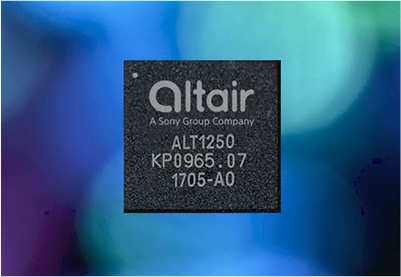Technology has a history of helping to track and treat viruses. And, with the World Health Organisation (WHO) declaring COVID-19 a global pandemic, people are rightly asking themselves how new technologies such as the Internet of Things (IoT), artificial intelligence (AI), and Big Data can be employed to slow down the proliferation of pandemics and avoid a future global health crisis.
In this article, Igor Tovberg, director of product marketing at Altair Semiconductor, a Sony Group company, describes how connected medical devices could help.
Monitoring trends with wearables
Millions of wearable devices have been deployed globally. Activity and heart-rate sensing are becoming a baseline feature in every fitness band and smartwatch, with data being continuously sensed and uploaded into the cloud. Would this data be useful in predicting a spreading epidemic?
Indeed, a recently published study by Scripps Research Translational Institute in The Lancet Digital Health analysed such data and found that resting heart rate and sleep-duration data collected from wearable devices could help inform timely and accurate models of population-level influenza trends. Sensing and analysing more physiological factors would improve the speed and accuracy in the discovery of epidemics.
Changes in patient care habits
Isolation is one of the preventive actions being taken to stop the virus spread, as exposure to an infected carrier could prove fatal for people with a weakened immune system. Now, more than ever, health stats relating to virus symptoms can be sent to health care providers without patients having to visit their clinic and risking exposure.
mHealth

Connected devices such as thermometers, blood pressure metres, inhalers, glucose metres, or other personal health monitoring devices will play a significant role in protecting people’s lives. Cellular connectivity through the CAT-M or NB-IoT network can ensure a secure and reliable countrywide link for the delivery of patients’ stats to their health care provider from any location, regardless of WiFi/BLE coverage. Connected out-of-the-box cellular-based devices are freeing doctors from relying on a patient’s ability to set up the LAN/PAN connection by themselves.
Quarantine compliance with smart cellular IoT wristbands
The general population can wear smart wristbands as a health monitor. With an emphasis on the small size and long battery life, Cellular IoT offers reliable connectivity for smart wristbands, with autonomy from paired smartphones. Recently, the Hong Kong Government has deployed smart wristbands to monitor city residents quarantined inside their homes.
Accelerating the speed of reaction
Monitoring is vital in the detection chain, and reaction time is critical for prevention. Enterprises, airports, and cities would surely benefit from monitoring devices for citizens, and healthcare facilities would benefit from the ability to monitor remote patients. Timely discovery of outbreaks could prevent many new dangerous viruses in the future.
Solution
For personal, medical, or environmental monitoring, Altair’s ALT1250 ultra-low power, compact, secure, and highly integrated cellular IoT chipset enables slimmer devices with long battery life, which can remain continuously connected reliably connecting people in ways previously unobtainable. All without the need for a smartphone or home WiFi network.
In conclusion
According to Bill Gates, in any crisis, leaders have two equally important responsibilities: Solving the immediate problem and keeping it from happening again. It’s clear that IoT technology, and specifically medical devices, have an important role to play in the containment and treatment of outbreaks like COVID-19. I genuinely believe that IoT can be fully harnessed to control and potentially prevent the next global pandemic.
The author is Igor Tovberg, director of product marketing at Altair Semiconductor, a Sony Group company.
Comment on this article below or via Twitter: @IoTNow_OR @jcIoTnow










